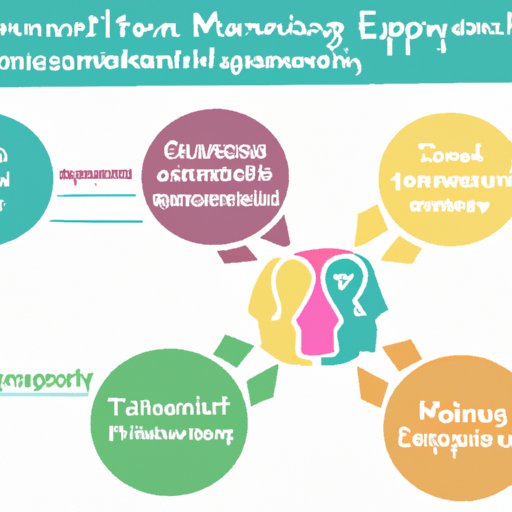Introduction
Emotional intelligence is a concept that has been gaining traction in recent years as a key component of successful leadership. It involves understanding oneself and others on an emotional level, and using this knowledge to navigate interpersonal relationships and make informed decisions. While emotional intelligence is not the only factor in successful leadership, it can be a powerful tool to help leaders become more effective.
Definition of Emotional Intelligence
Emotional intelligence (EI) is defined as “the ability to identify, use, understand, and manage one’s own emotions in positive ways to relieve stress, communicate effectively, empathize with others, overcome challenges and defuse conflict” (American Psychological Association, 2017). Emotional intelligence is distinct from cognitive intelligence, which focuses on the intellectual aspects of problem-solving and decision-making. Emotional intelligence, on the other hand, is concerned with understanding and managing emotions. It is an important skill for leaders because it helps them to better understand themselves and their team members, as well as to effectively manage interpersonal relationships.
Problem of Poor Leadership and Emotional Intelligence
Leadership is an essential component of any organization, and poor leadership can have serious consequences. Research has shown that leaders with low emotional intelligence are more likely to engage in unethical behavior, create hostile work environments, and make bad decisions (Goleman, 1995; Mayer et al., 2008). Furthermore, leaders with low emotional intelligence tend to struggle to motivate and inspire their teams, resulting in decreased productivity and morale (Mayer et al., 2008). Therefore, it is important for leaders to cultivate emotional intelligence in order to become more effective.
Develop Self-Awareness
The first step in improving emotional intelligence is to develop self-awareness. This involves understanding one’s own emotions and recognizing how they affect decision-making. Leaders should strive to recognize their own feelings, both positive and negative, and how these emotions can impact their interactions with others. Additionally, leaders should be mindful of their body language and facial expressions, as these can often give away underlying feelings or intentions. By becoming aware of their own emotions and behaviors, leaders can begin to gain insight into how they interact with others and how their actions might be interpreted.
Practice Active Listening
Active listening is an important tool for developing emotional intelligence. This involves listening carefully and paying attention to details. Leaders should strive to understand what their team members are saying and be open to their perspectives. They should also be cognizant of nonverbal cues, such as body language or tone of voice, which can indicate underlying feelings. Active listening enables leaders to gain insights into their team members and develop a better understanding of their needs and motivations.
Foster Empathy
Leaders should also strive to foster empathy in order to improve emotional intelligence. This involves considering the feelings and perspectives of others. Leaders should strive to put themselves in the shoes of their team members and think about how their words and actions might affect them. This can help leaders to make decisions that take into account the needs and feelings of their team members, as well as to provide more meaningful feedback and support.
Enhance Self-Regulation
Self-regulation is another key component of emotional intelligence. This involves recognizing and managing impulses and creating strategies to respond appropriately. Leaders should strive to recognize their own triggers and be mindful of how their emotions might affect their behavior. Additionally, leaders should strive to develop strategies for responding to difficult situations in a constructive manner. This could involve taking a step back to assess the situation, focusing on finding solutions, or seeking out the perspectives of others.
Cultivate Social Skills
Social skills are also essential for developing emotional intelligence in leadership. This involves learning effective communication, as well as negotiation and conflict resolution. Leaders should strive to communicate clearly and concisely, as well as to actively listen to their team members. Additionally, they should strive to be open to different perspectives and to negotiate in a respectful manner. Finally, they should strive to resolve conflicts in a way that is fair and beneficial to all parties involved.
Improve Stress Management
Stress management is another important aspect of emotional intelligence. This involves identifying sources of stress and developing strategies to manage it. Leaders should strive to recognize when they are feeling overwhelmed and take steps to address it. This could involve taking breaks, engaging in physical activity, or seeking out the support of others. Additionally, leaders should strive to create a supportive environment for their team members and to provide resources to help them manage stress.
Nurture Positive Relationships
Finally, leaders should strive to nurture positive relationships with their team members. This involves building strong relationships with colleagues and supporting team members. Leaders should strive to be approachable and to create an inclusive environment where everyone feels respected and valued. Additionally, they should strive to provide meaningful feedback and recognition to their team members in order to foster a sense of connection and collaboration.
Conclusion
In conclusion, improving emotional intelligence can help leaders become more effective. This involves developing self-awareness, practicing active listening, fostering empathy, enhancing self-regulation, cultivating social skills, improving stress management, and nurturing positive relationships. Through these strategies, leaders can gain insight into their own emotions and those of their team members, as well as to make informed decisions and demonstrate effective leadership.
(Note: Is this article not meeting your expectations? Do you have knowledge or insights to share? Unlock new opportunities and expand your reach by joining our authors team. Click Registration to join us and share your expertise with our readers.)
